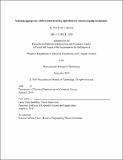Selecting appropriate reinforcement-learning algorithms for robot manipulation domains
Author(s)
LaGrassa, Alex Licari.
Download1145122826-MIT.pdf (4.970Mb)
Other Contributors
Massachusetts Institute of Technology. Department of Electrical Engineering and Computer Science.
Advisor
Leslie Pack Kaelbling.
Terms of use
Metadata
Show full item recordAbstract
Engineering reinforcement learning agents for application on a particular target domain requires making decisions such as the learning algorithm and state representation. We empirically study the performance of three reference implementations of model-free reinforcement learning algorithms: Covariance Matrix Adaptation Evolution Strategy, Deep Deterministic Policy Gradients, and Proximal Policy Optimization. We compare their performance on various target domains to measure quantitatively their dependence on varied features of the environment. We study the effect of actuation noise, observation noise, reward sparsity and task horizon. Then, we explore automatically generated state encodings for learning using a lower-dimensional encoding from high dimensional sensor data. A proof-of- concept end-to-end system for scooping beads of different sizes in the real world generates, uses, then follows force traces along with a positional controller to execute a scoop.
Description
This electronic version was submitted by the student author. The certified thesis is available in the Institute Archives and Special Collections. Thesis: M. Eng., Massachusetts Institute of Technology, Department of Electrical Engineering and Computer Science, 2019 Cataloged from student-submitted PDF version of thesis. Includes bibliographical references (pages 73-78).
Date issued
2019Department
Massachusetts Institute of Technology. Department of Electrical Engineering and Computer SciencePublisher
Massachusetts Institute of Technology
Keywords
Electrical Engineering and Computer Science.